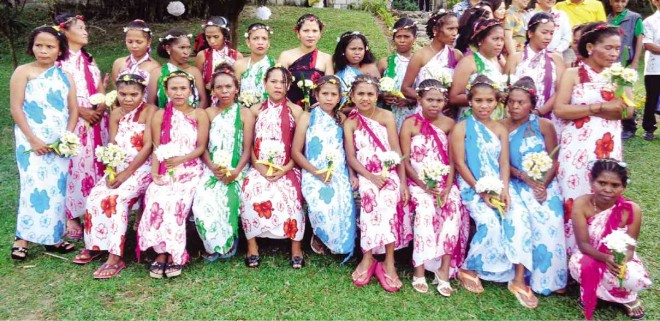Aetas tie knot to get marriage contracts for jobs, benefits

AETAS in Sitio Target in the upland village of Sapang Bato in Angeles City, belatedly found it necessary to formalize marriage rites so they can get marriage contracts required of them when they seek jobs, educational, health and social benefits. TONETTE T. OREJAS/
INQUIRER Central Luzon
ANGELES CITY—For 35 years, Carlito and Mely Ablong lived together in Sitio Target here without the benefits of a civil or church wedding. In the Aeta society, love, dowry and the consent of elders sealed the Ablong relationship, which produced 11 children.
But in an unusual leap of faith, the Ablong couple and 23 more pairs of Aetas were married in rites officiated on Saturday by Mayor Edgardo Pamintuan at a mountain clearing and resort that is frequented by Korean tourists.
Addressing the couples, Pamintuan said: “I am afraid to do this because I might offend Apo Namalyari. But since you requested me to solemnize your vows and you assured me that you will not throw away your indigenous culture, I will do this as part of my duties.”
Aetas believe in Apo Namalyari (He who makes things happen), a mountain deity guarding Mt. Pinatubo.
The couples underwent the civil rite to obtain legal documents required in employment, education, health and social benefits, according to Philip Sevilla, an Aeta leader and pastor.
Article continues after this advertisement“They needed the marriage contracts because the schools or companies asked for copies,” Sevilla said, to explain why the community tapped the Integrated Bar of the Philippines (IBP) chapter in Pampanga province to provide aid.
Article continues after this advertisementPeter Paul Maglalang, IBP Pampanga president, said the group helped the Aeta community file and secure documents pertaining to their clients’ late registration of birth.
The lawyers also drew up the couples’ affidavits of habitation.
Maglalang said the Pampanga chapter may be the only IBP unit that extends these forms of assistance to indigenous communities.
The Administrative Code and the Local Government Code of 1991 give local executives the power to officiate civil weddings, which was why Pamintuan was drawn into the program, Maglalang said.
IBP bought the couples’ floral shawls, flower head bands, necklaces and shorts to wear for the wedding. Friends of the IBP gave cakes, foods and drinks.
Mario Manialung, barangay (village) captain, said this was the first mass wedding in Sapang Bato, which is at the periphery of the Clark Freeport. “Our people are trying to cope with the requirements of mainstream society while maintaining their old culture,” he said.
The US military, which ran the Clark Air Base until 1991, did not require legal documents from Aetas, who then lived on menial jobs, including scavenging on garbage dumps, Manialung said.
Nenita Garcia, civil registrar, said marriage contracts were unheard of among Aetas here.
Jonalyn Lalut, 22, heavy with her second child, was the youngest bride at the ceremony. Mely Ablong was the oldest at 56.
Their respective husbands—Jimmy and Carlito—said they were not required to give out dowries in cash, carabaos or goats this time.
Sapang Bato is the only village in Angeles that hosts the Aeta population, Manialung said.
The Aetas are dispersed in Sitios Target (181 families), Babo (76 families) and Bliss (48 families), comprising 3 percent of the more than 11,000 residents in Sapang Bato.
The Aetas here evacuated to Palayan City in Nueva Ecija province shortly after the June 1991 eruptions of Mt. Pinatubo. They returned five years later to revive their mountain plots and secure jobs in Clark.